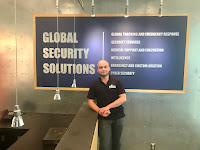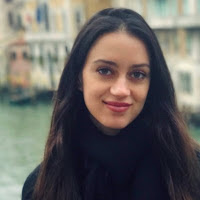After completing his academic coursework in the Master of Arts in Global Risk (MAGR) in Bologna, Aleksandr Skop is spending his summer working at Global Guardian in McLean, Virginia. Below are his reflections on the summer experience and his year in Bologna. For more information on the MAGR program, please visit our website.
 |
| Aleksandr Skop at Work |
As what I can only describe as a life-changing year in Bologna drew to an end, I had to reluctantly leave Europe and return back to the Washington, DC metropolitan area. As the final part of the MAGR degree, I would spend this summer interning at Global Guardian in McLean, Virginia. Global Guardian is a global travel security provider, which offers tailor-made security, monitoring, and emergency response solutions to clients, ranging from 24/7 surveillance of properties, to medical evacuation in over 80 countries around the globe. At Global Guardian, I work under the Lead Intelligence Analyst, helping to produce intelligence briefs, safety reports, and real-time analysis, as well as cyber-security solutions. The internship is full-time, with flexible hours, and two months in duration.
The MAGR degree gave me the tools necessary to conduct qualitative and quantitative risk analysis in finance, international relations, economics, and other subjects. The most important aspect of risk analysis is the ability to not only properly assess, but to be able to communicate and deliver the analysis in a clear, concise manner. Among the most crucial “hard” skills the MAGR program has helped me develop is an effective writing style. At Global Guardian, my primary responsibility is writing weekly analytical briefs on the most pressing world events pertaining to clients’ personal and business interests. Some examples include: terrorist attacks in Europe, global cyber-security risks posed by ransomware attacks, the threat of North Korea’s nuclear program, and economic and security impacts of falling oil prices. Other tasks included open source research and analysis of a high-profile client’s online presence in order -to assess potential threats to their family and business.
The work environment at Global Guardian has been welcoming and friendly. The company is incredibly flexible and accommodating in terms of hours, and the staff is eager to answer any and all questions about the business model, operations, and mission of Global Guardian. I am incredibly satisfied with my decision to complete my Capstone Project here, and believe it is a hugely positive experience in my professional growth and development.
Aleksandr Skop
MAGR Student
SAIS Europe 2017
Aleksandr Skop
MAGR Student
SAIS Europe 2017



